Streamlining Safeguarding - How Central Data Teams Enhance Trust Processes :: NPCAT

Established in 2018, Nicholas Postgate Catholic Academy Trust (NPCAT) has grown to serve 38 schools, including 32 Primary and 6 Secondary schools with 2 Sixth forms, under the Diocese of Middlesbrough. Spanning the Tees Valley, Richmond, and extending to the city of York, our schools uphold a commitment to catholic education in our communities.
The Safeguarding team at NPCAT plays a pivotal role in maintaining the safety and well-being of our schools. Their responsibilities include conducting 6 supervisory visits and 1 audit annually for each of our 38 schools, totaling 266 visits per year. This rigorous process involves a meticulous examination of 103 checks across 16 categories, amounting to 27,398 checks annually. These checks encompass both statutory requirements outlined by the Department for Education (DfE) as well as widely regarded best practices, ensuring a comprehensive evaluation.
The thoroughness of the safeguarding process is evident in both the quantity and range of checks conducted, which cover areas such as staff training, premises security, and student well-being. Each aspect is meticulously examined to ensure compliance with statutory requirements and best practices which is vital for fostering safe and nurturing learning environments. Before the involvement of the data team, data collection was restricted to audits, capturing only 14% (3,914) of total checks meaning each school data point was only updated at the subsequent audit in 12 months time.
The Problem
The implications of outdated safeguarding data became apparent during an internal briefing from the data team to the Trust Executive Leadership Team which highlighted the critical need for timely and accurate information. This realisation emerged when data for a school was found to be over nine months old, casting doubt on the relevance of data from other schools, especially when it was clarified that the identified issues had been promptly addressed following the audit. To rectify this, it was deemed necessary to capture all 106 checks during each subsequent visit to maintain data relevance; failure to do so risked scrapping recording the data digitally completely. However, the implementation of this solution proved more intricate than initially anticipated. Addressing this challenge went beyond simply instructing the team to complete forms during visits as it became apparent that the Safeguarding team often encountered difficulties in promptly submitting data due to the significant paperwork associated with audits and visits. Additionally, completing the digital checklist was delayed until after the written report was generated and even then it took a long time to complete as it meant cross referencing the paperwork highlighting process duplication and inefficiency.
Solution Implementation
To address the challenges faced with outdated information as well as streamline our safeguarding processes, a comprehensive solution was devised requiring the restructuring of the workflow. We introduced a slightly expanded digital form, designed to seamlessly integrate with a template document through a mail merge upon submission. By having our team complete this form during audits or visits, we ensured that the majority of the written report could be automatically generated whilst simultaneously capturing the data points without any latency.
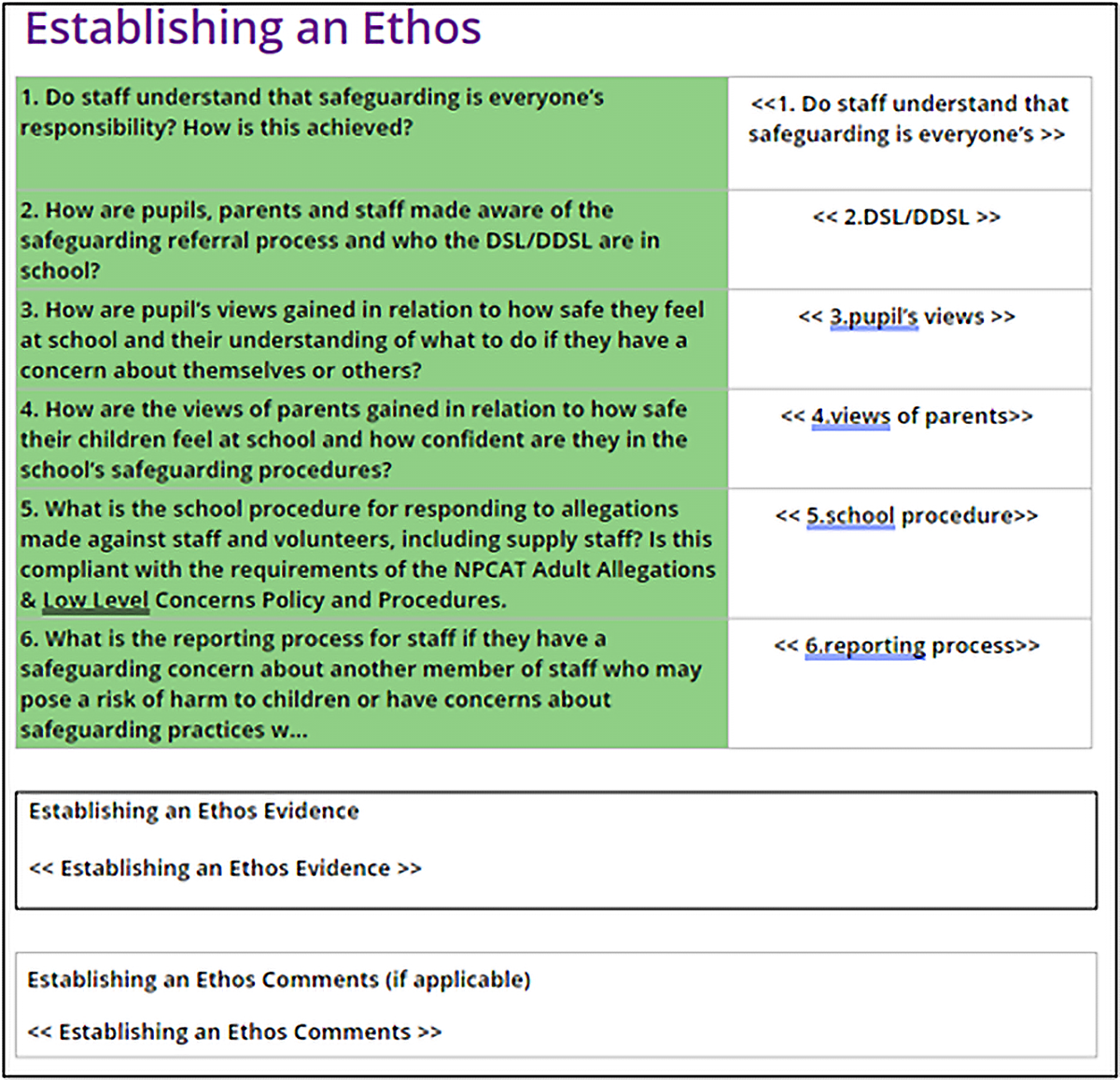
When looking at options for this, Microsoft Forms was selected because it allowed for native integration into Microsoft’s automation tool, Power Automate. Google forms can achieve the same outcome but it relies on a knowledge of google apps scripts code whereas Power Automate primarily uses a graphical user interface to build process automation flows. It was felt that it would also be easier to train people on the process of maintaining and amending any Power Automate solution because of the user interface and therefore the process would have a lower barrier to entry and be less reliant on an individual with a specific skill set.
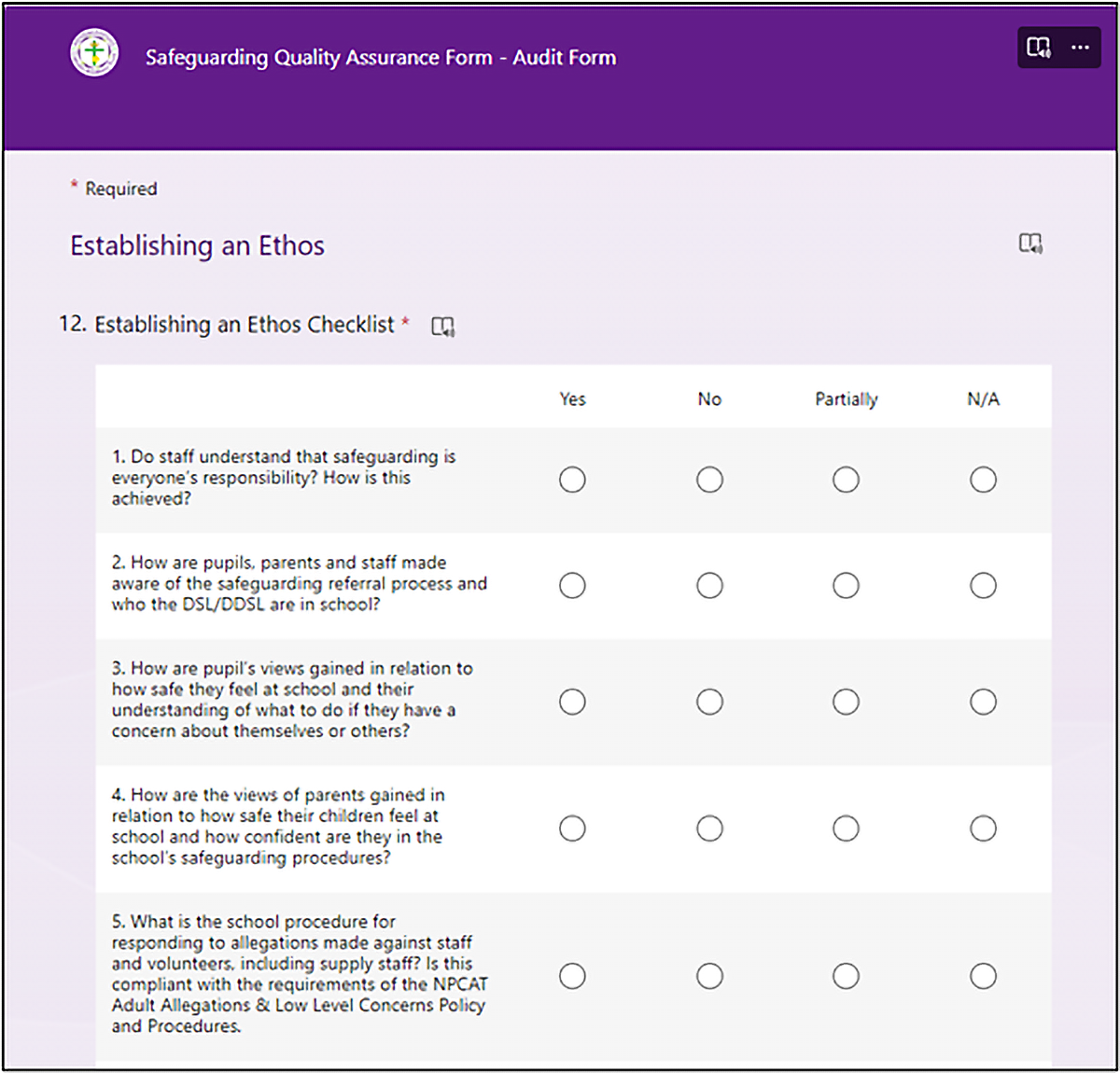
Power Automate was used to handle the storage of audit and visit responses, send short summaries of the audit and visits to our senior standards team and then to produce the first draft written report which would be sent back to the submitter of the form. This digital form and automation not only addressed the challenge of outdated information but also transformed our safeguarding process into a more dynamic, efficient, and data-rich system.
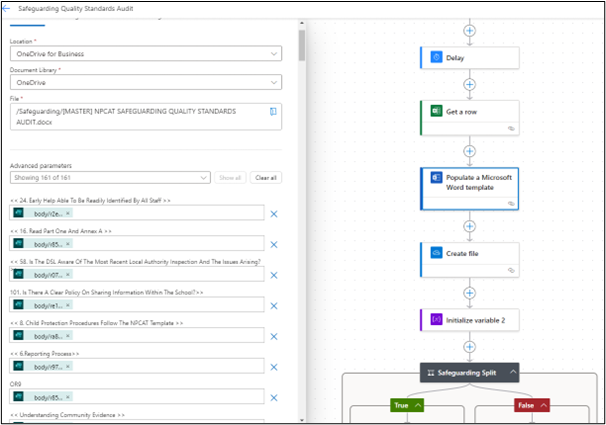
Results and Benefits
The implementation of streamlined processes within the Safeguarding team at NPCAT has led to significant improvements and advantages. Firstly, there has been a noticeable improvement in the team’s productivity and efficiency. The number of audits completed per month has notably increased, while the time spent on administrative tasks has significantly decreased.

This newfound efficiency has allowed the team to spend more time advising schools rather than just reporting back results, thereby enhancing the safety and well-being of students and staff across schools. These positive changes would not have been possible without the reduction in repetitive tasks facilitated by automation.
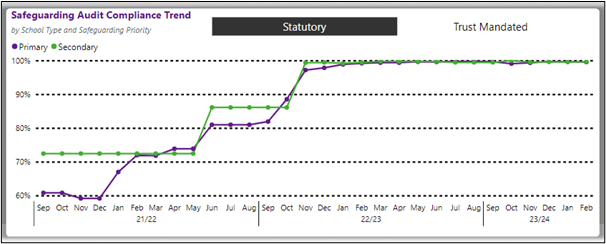
The chart in Fig 5. tracks the compliance across the NPCAT. Between September 2021 and October 2022 only audits were recorded. The identification of the problem with latency was identified in early October 2022 and the solution implemented in December 2022 which is where the most recent visit was also added to the data set. The increased data granularity now confirms safeguarding was in a good place in October 2022 but the data simply wasn’t there. The Trust can subsequently be reassured that the safeguarding of students is consistently a high standard. The introduction of a dashboard reporting system has further enhanced data analysis capabilities, enabling stakeholders to track progress, visualise trends, and gain valuable insights into safeguarding performance across the Trust.
Conclusion
The adoption of automated processes within NPCAT’s Safeguarding team represents a major advancement in enhancing safeguarding practices and enhancing outcomes. This journey has yielded remarkable results, including heightened capacity and output, augmented data granularity, and streamlined efficiency with reduced workload. By eliminating duplication and embracing automation, the team now allocates more time to proactive safeguarding measures, fostering safer and more nurturing environments for students and staff across NPCAT. Furthermore, the implementation of a dashboard reporting system empowers stakeholders to track progress and make informed decisions based on timely data insights. Reflecting on this transformative experience, it becomes evident that timely and precise data play a crucial role in safeguarding, emphasising the importance of technology-driven solutions in being a catalyst for positive change.
Skills Required
To effectively streamline our safeguarding processes, six key skills were used throughout the project. A Trust or school looking to have a similar impact will likely need these skills which are:
Problem-Solving and Analytical Skills: Individuals must demonstrate proficiency in identifying inefficiencies within existing processes and devising effective solutions. Additionally, they need the ability to analyse complex issues related to data management and workflow optimisation. Critical thinking skills are also necessary to evaluate data trends and make informed decisions.
Technical Proficiency in Data Management: Competence in using digital tools such as Microsoft Forms and Power Automate for data collection, storage, and automation is essential. Furthermore, individuals should possess the skill to create and maintain digital forms, ensuring they capture necessary information accurately and efficiently. The technical skills in this project are relatively low entry, as these tools require little or no code to use as they follow an easy-to-use user interface with training materials widely available online in both blogs and videos.
Effective Communication and Collaboration: Strong communication skills are necessary to articulate the importance of timely and accurate data in safeguarding practices. Additionally, individuals must exhibit the ability to collaborate effectively with technical teams to integrate digital solutions seamlessly into existing processes. Aptitude for facilitating productive discussions and consensus-building among stakeholders further enhances effectiveness.
Adaptability and Learning Agility: Individuals should demonstrate willingness to embrace new technologies and tools to enhance productivity and effectiveness. Moreover, they need the capacity to quickly acquire and apply new skills in response to evolving needs. Openness to feedback and a commitment to continuous learning and improvement are integral aspects of this skill set
Attention to Detail and Quality Assurance: Dedication to maintaining high standards of data accuracy and completeness throughout the safeguarding process is essential. Diligence in ensuring that the digital forms capture all necessary information accurately and with appropriate validation in place during audits and visits is imperative. Rigorous quality assurance practices to verify the reliability and integrity of safeguarding data are similarly fundamental.
Commitment to Continuous Improvement and Innovation: Cultivation of a culture of continuous improvement, where team members actively seek opportunities to enhance processes and outcomes, is critical. Encouragement of innovation in leveraging technology to streamline workflows and optimise resources is key. Regular evaluation of processes and procedures to identify areas for refinement and enhancement ensures ongoing improvement.
Nick Doy
Nicholas Postgate Catholic Academy Trust
Read more case studies
View all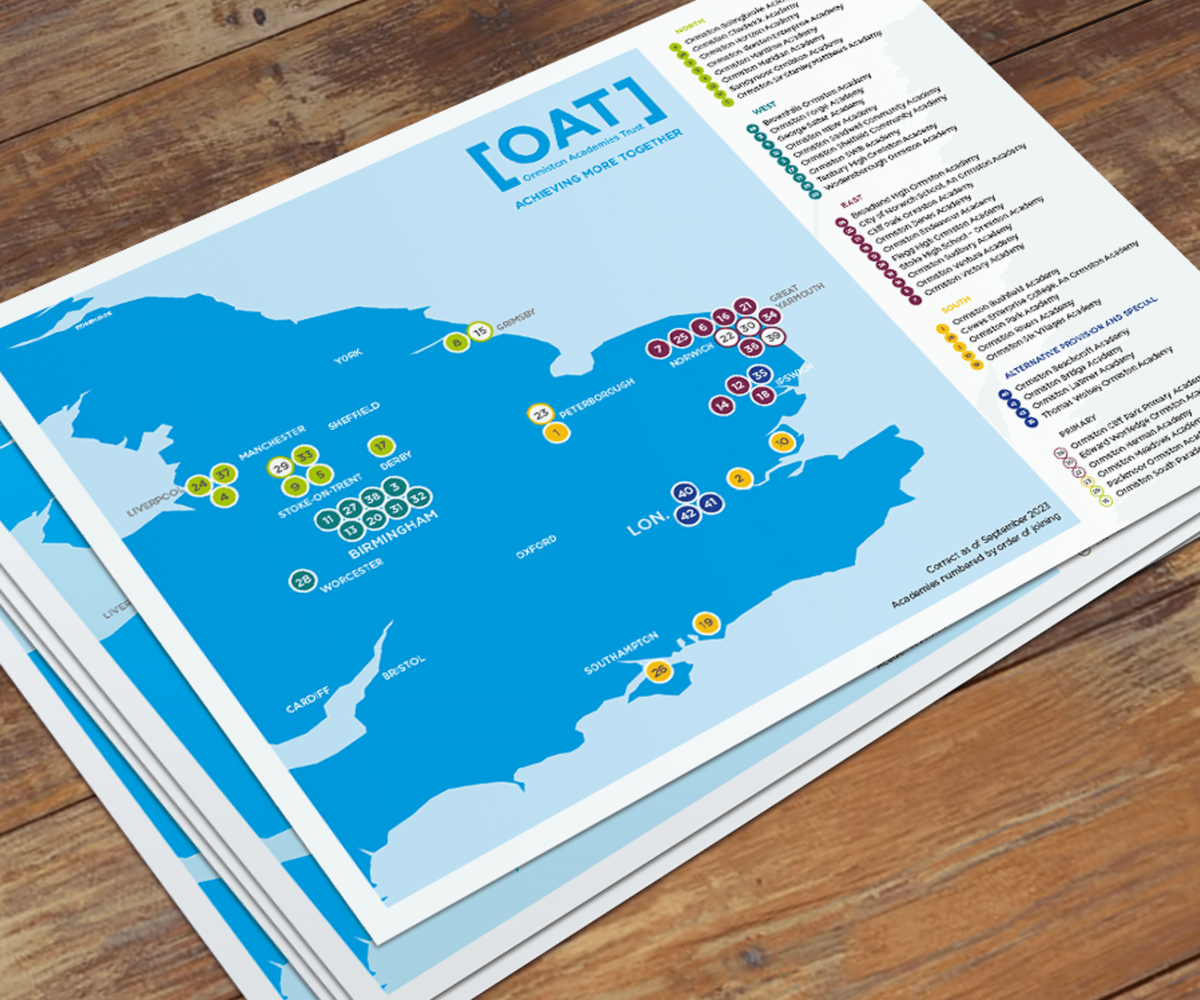
Strategic Progress Reporting & MAT Census :: OAT

Implementing MAT Dashboards with Google Tools :: FCAT
